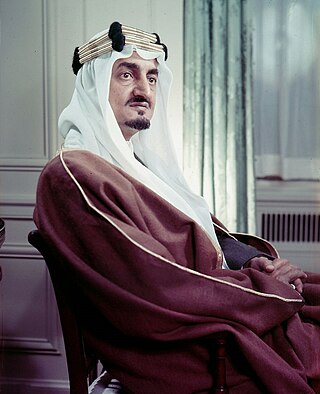
Faisal bin Abdulaziz Al Saud was a Saudi Arabian statesman and diplomat who was King of Saudi Arabia from 2 November 1964 until his assassination in 1975. Prior to his ascension, he served as Crown Prince of Saudi Arabia from 9 November 1953 to 2 November 1964, and he was briefly regent to his half-brother King Saud in 1964. He was prime minister from 1954 to 1960 and from 1962 to 1975. Faisal was the third son of King Abdulaziz, the founder of modern Saudi Arabia, and the second of Abdulaziz's six sons who were kings.

Fahd bin Abdulaziz Al Saud was a Saudi Arabian politician who was King and Prime Minister of Saudi Arabia from 13 June 1982 until his death in 2005. Prior to his ascension, he was Crown Prince of Saudi Arabia from 25 March 1975 to 13 June 1982. He was the eighth son of King Abdulaziz, the founder of modern Saudi Arabia.

Sultan bin Abdulaziz Al Saud, called Sultan the Good in Saudi Arabia, was the Saudi defense minister from 1963 to 2011 and the Crown Prince of Saudi Arabia from 2005 to 2011.
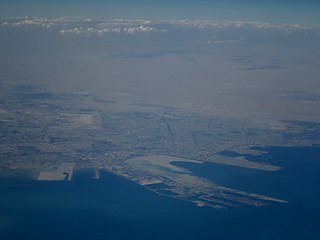
Dammam is the fifth-most populous city in Saudi Arabia after Riyadh, Jeddah, Mecca, and Medina. It is the capital of the Eastern Province. With a total population of 1,252,523 as of 2020. The judicial and administrative bodies of the province, in addition to the administrative offices of other minor governmental departments functioning within the province, are located in the city. The word itself is generally used to refer to the city, but may also refer to its eponymous governorate.

King Faisal University (KFU) is a public university with the main campus in the city of Hofuf in Al Ahsa, Saudi Arabia founded in 1975. KFU was initially established with four colleges: two in Dammam and the other two in Al-Ahsa. Later, the colleges in Dammam have been segregated to become the Imam Abdulrahman Bin Faisal University.

The Emirate of Nejd or Imamate of Nejd was the Second Saudi State, existing between 1824 and 1891 in Nejd, the regions of Riyadh and Ha'il of what is now Saudi Arabia. Saudi rule was restored to central and eastern Arabia after the Emirate of Diriyah, the First Saudi State, having previously been brought down by the Ottoman Empire's Egypt Eyalet in the Ottoman–Wahhabi War (1811–1818).
The King Faisal Specialist Hospital and Research Centre (KFSH&RC) is tertiary referral hospital in Riyadh, the capital city of Saudi Arabia.
Health care in Saudi Arabia is a national health care system in which the government provides free universal healthcare coverage through a number of government agencies. There is also a growing role and increased participation from the private sector in the provision of health care services. Saudi Arabia has been ranked among the 26 best countries in providing high quality healthcare.
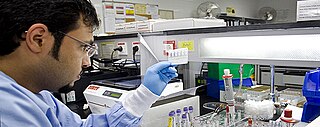
The Ministry of National Guard Health Affairs(MNG-HA) is a government-funded health system in the Kingdom of Saudi Arabia, founded in 1983. It is affiliated with the Ministry of National Guard and the Saudi Arabian National Guard, consisting of medical cities spread in many regions.

Imam Abdulrahman Bin Faisal University (IAU), formerly known as the University of Dammam (UoD), is a university in Dammam, Saudi Arabia. It is one of the oldest universities in the Eastern Province of Saudi Arabia. It is one of the leading universities in medicine for both male and female students. After its separation from King Faisal University, it is now thriving to become one of the best universities in the Kingdom.

Princess Nourah Bint Abdulrahman University is a public women's university located in Riyadh, the capital of Saudi Arabia. It is the largest women's university in the world.
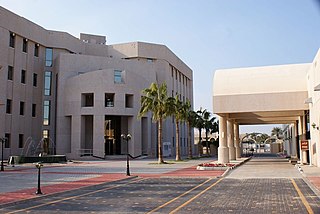
The 'College of Dentistry at the Imam Abdulrahman bin Faisal University is a school of Dentistry associated with the Imam Abdulrahman bin Faisal University; its purpose is to disseminate knowledge of all disciplines of dentistry and promote development in dental education, treatment, and research.
The Grand Mufti of Saudi Arabia is the most senior and most influential Muslim religious and legal authority in Saudi Arabia. The holder of the position is appointed by the King. The Grand Mufti is the head of the Permanent Committee for Islamic Research and Issuing Fatwas.

Abdullah bin Abdulaziz Al Rabeeah is a Saudi pediatric surgeon. He has filled a number of supervisory and advisory roles in Saudi Arabia, including Minister of Health, Advisor to the Royal Court, and Supervisor General of the international aid agency KSrelief.

The Ministry of Health, commonly abbreviated to MoH, is the ministry overseeing the health care and health policy of Saudi Arabia. The ministry is tasked with formulating strategies to ensure public health in the country, while also managing crucial health infrastructure.
The following is a Gregorian timeline of the history for the city of Riyadh, Saudi Arabia.
Musa'id bin Abdulaziz Al Saud was the twelfth son of King Abdulaziz, the founder of Saudi Arabia. He was a businessman and the father of Faisal bin Musaid, the assassin of his half-brother King Faisal.
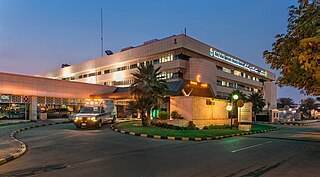
King Fahad Specialist Hospital-Dammam (KFSHD) is a hospital in the Eastern region of Saudi Arabia.
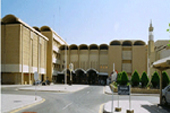
The College of Medicine in King Saud University was established as the first medical college in the Kingdom in 1967. One year later, King Abdul-Aziz University Hospital, became affiliated with the college and subsequently in 1981, King Khalid University Hospital and the new college building were established to become the main teaching campus and patient service facility. To date, the college has graduated more than 4000 undergraduate students, 200 postgraduates students, and more than 700 graduates from different medical specialties fellowship programs.
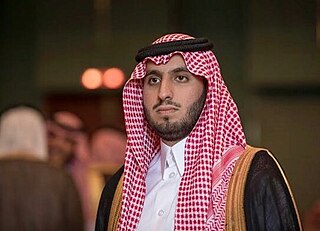
Musaʽad bin Khalid bin Musaʽad bin ʽAbdulrahman Al Saʽud is a Saudi prince and businessman. He is the son of Prince Khalid Bin Musa’ad bin Abdulrahman Al Saud, a prominent Saudi businessman in real estate. His mother is Princess Abeer bint Faisal bin Abdulrahman bin Ahmad Al Sudairy.
















